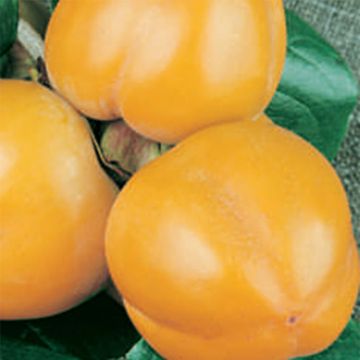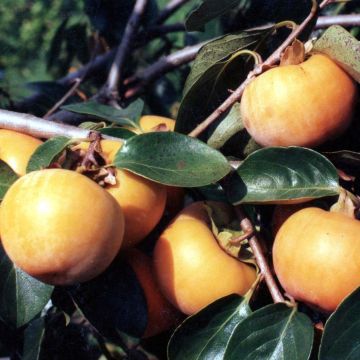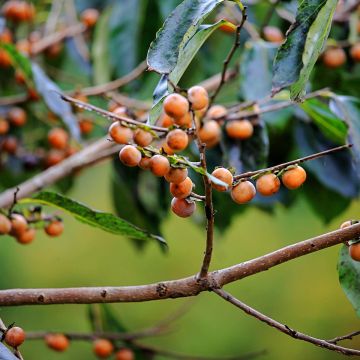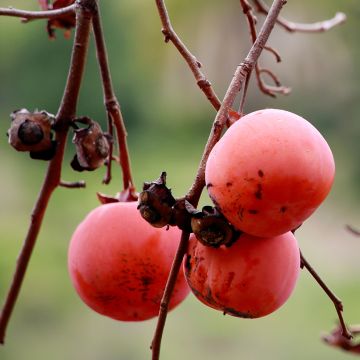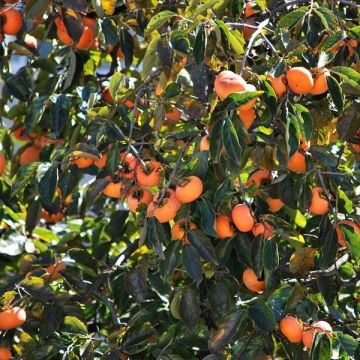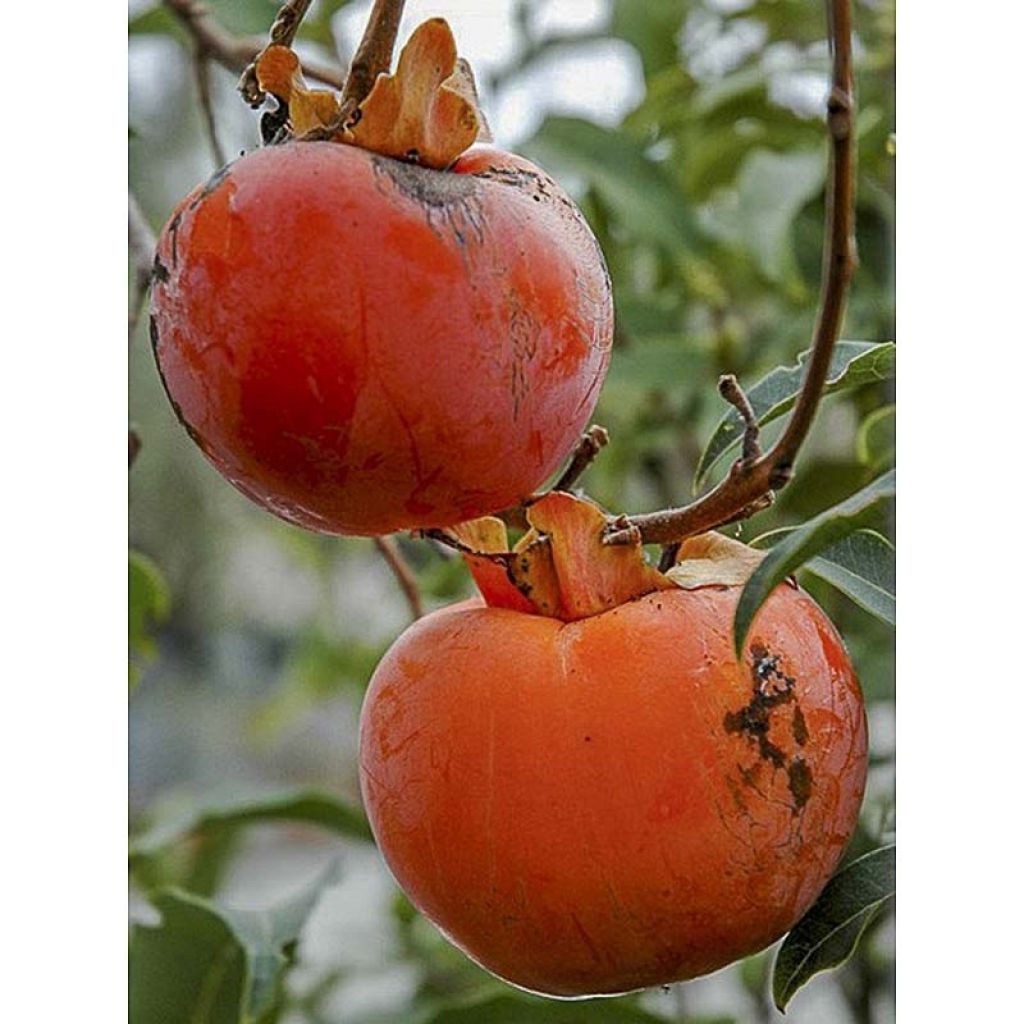

Diospyros kaki Cioccolatino - Persimmon
Diospyros kaki Cioccolatino - Persimmon
Diospyros kaki Cioccolatino
Persimmon, Kaki, Japanese Persimmon, Oriental Persimmon
Livraison rapide et soignée
Martine, 27/09/2022
Why not try an alternative variety in stock?
View all →This plant carries a 6 months recovery warranty
More information
We guarantee the quality of our plants for a full growing cycle, and will replace at our expense any plant that fails to recover under normal climatic and planting conditions.
Oversize package: home delivery by special carrier from €6.90 per order..
Express home delivery from €8.90.
Delivery to Corse prohibited: UE law prohibits the import of this plant from mainland France to Corse as part of the fight against Xylella fastidiosa. Please accept our sincere apologies.
More information
Description
Diospyros kaki 'Cioccolatino' is an ancient variety of Italian Persimmon tree that is interesting for its excellent productivity and its non-astringent fruits of good taste that can be consumed right after harvest, when they are still firm and crunchy, like apples. They are round, medium-sized, and yellow-orange in colour. Their bronze-orange flesh becomes softer and very dark after complete ripening, with a chocolate bronze colour. This variety, which requires long, hot, and sunny summers, is grown in the southern half of France and similar regions. Harvest begins at the end of October. The moderately-sized tree is well-suited for small gardens. 'Cioccolatino' is an excellent pollinator for 'Tipo', 'Hana Fuyu', and 'Rouge Brillant' Persimmons.
The Kaki 'Cioccolatino' forms a medium-sized tree, approximately 4-5m (13-16ft) tall and 3-4m (10-13ft) wide. It belongs to the category of non-astringent Persimmons, which means they can be consumed before they become over-ripe. However, it is also possible to let the fruits over-ripen, either on or off the tree, to make them softer and sweeter. The fruits are medium to small-sized, round, with a yellow-orange to light orange skin and a fairly firm texture. The flesh is of good quality right after harvest and contains seeds. The fruits can be cooked into jams or compotes, eaten raw in salads with or without cream, or dried like figs. Explore all the different ways to discover their various flavours.
The Kaki (Dyospiros kaki) is a tree native to China, with a rounded habit, reaching 6 to 10m (20 to 33ft) in height and 5 to 7m (16 to 23ft) in width, depending on the variety. Its growth is rather slow. Belonging to the Ebony family, its wood is very hard. The Persimmon leaves are elongated, about fifteen centimetres long, and shiny green. They often display beautiful autumn colours. The 'Cioccolatino' Persimmon is hardy up to -15°C (5°F), but occasional severe frosts in the eastern and northern regions can weaken it. It enjoys both heat and sunlight. It is a self-fertile variety, so it is not necessary to plant another Persimmon tree nearby to obtain fruits. The flowering is late, appearing in May-June, and consists of small, insignificant yellow flowers that are pollinated by insects.
Diospyros kaki is a subtropical species that has adapted very well to the hot and dry Mediterranean climate in summer. Planting is done in frost-free autumn or winter, or alternatively in spring with regular watering. Choose a sunny and sheltered location. The Chinese Persimmon tree thrives in all types of soils, preferably slightly acidic. It prefers well-drained and rich soils. If you plant multiple trees, space them 5 to 7m (16 to 23ft) apart in all directions.
This beautiful genus name, Diospyros, comes from Greek and means "fruit of the gods"!
Report an error about the product description
Diospyros kaki Cioccolatino - Persimmon in pictures


Plant habit
Fruit
Flowering
Foliage
Botanical data
Diospyros
kaki
Cioccolatino
Ebenaceae
Persimmon, Kaki, Japanese Persimmon, Oriental Persimmon
Cultivar or hybrid
Other Persimmon trees - Diospyros
Planting and care
The planting of the Chocolate Persimmon is done in the frost-free autumn/winter or alternatively in spring with regular watering. Choose a very sunny, warm and sheltered location. The Chinese Persimmon thrives in all types of soil, preferably with an acidic tendency. It fears excess limestone. It flourishes in deep, well-drained and rich soils. Once well rooted, it tolerates water shortage quite well in summer. If you plant several young plants, space them 5 to 7m (16 to 23ft) apart in all directions.
Soak the root ball in water for a few moments before planting. Dig a hole 3 to 4 times the volume of the root ball, making sure to separate the bottom soil from the topsoil. Mix the bottom soil with crushed horn and well-rotted compost or potting soil, then pour this mixture into the planting hole. Install a stake. Place the root ball, without burying the collar, cover with the topsoil and firm it down. Form a basin around the base and water generously. Attach the stake to the plant, crossing the tie in the shape of an 8, without touching the trunk. Watering should be regular in the first year and then as needed, mainly in case of high temperatures.
In spring, every year, apply well-rotted compost by surface scratching, taking care not to damage the roots.
Persimmons are not very susceptible to diseases and pests.
Planting period
Intended location
Care
-
, onOrder confirmed
Reply from on Promesse de fleurs
Haven't found what you were looking for?
Hardiness is the lowest winter temperature a plant can endure without suffering serious damage or even dying. However, hardiness is affected by location (a sheltered area, such as a patio), protection (winter cover) and soil type (hardiness is improved by well-drained soil).

Photo Sharing Terms & Conditions
In order to encourage gardeners to interact and share their experiences, Promesse de fleurs offers various media enabling content to be uploaded onto its Site - in particular via the ‘Photo sharing’ module.
The User agrees to refrain from:
- Posting any content that is illegal, prejudicial, insulting, racist, inciteful to hatred, revisionist, contrary to public decency, that infringes on privacy or on the privacy rights of third parties, in particular the publicity rights of persons and goods, intellectual property rights, or the right to privacy.
- Submitting content on behalf of a third party;
- Impersonate the identity of a third party and/or publish any personal information about a third party;
In general, the User undertakes to refrain from any unethical behaviour.
All Content (in particular text, comments, files, images, photos, videos, creative works, etc.), which may be subject to property or intellectual property rights, image or other private rights, shall remain the property of the User, subject to the limited rights granted by the terms of the licence granted by Promesse de fleurs as stated below. Users are at liberty to publish or not to publish such Content on the Site, notably via the ‘Photo Sharing’ facility, and accept that this Content shall be made public and freely accessible, notably on the Internet.
Users further acknowledge, undertake to have ,and guarantee that they hold all necessary rights and permissions to publish such material on the Site, in particular with regard to the legislation in force pertaining to any privacy, property, intellectual property, image, or contractual rights, or rights of any other nature. By publishing such Content on the Site, Users acknowledge accepting full liability as publishers of the Content within the meaning of the law, and grant Promesse de fleurs, free of charge, an inclusive, worldwide licence for the said Content for the entire duration of its publication, including all reproduction, representation, up/downloading, displaying, performing, transmission, and storage rights.
Users also grant permission for their name to be linked to the Content and accept that this link may not always be made available.
By engaging in posting material, Users consent to their Content becoming automatically accessible on the Internet, in particular on other sites and/or blogs and/or web pages of the Promesse de fleurs site, including in particular social pages and the Promesse de fleurs catalogue.
Users may secure the removal of entrusted content free of charge by issuing a simple request via our contact form.
The flowering period indicated on our website applies to countries and regions located in USDA zone 8 (France, the United Kingdom, Ireland, the Netherlands, etc.)
It will vary according to where you live:
- In zones 9 to 10 (Italy, Spain, Greece, etc.), flowering will occur about 2 to 4 weeks earlier.
- In zones 6 to 7 (Germany, Poland, Slovenia, and lower mountainous regions), flowering will be delayed by 2 to 3 weeks.
- In zone 5 (Central Europe, Scandinavia), blooming will be delayed by 3 to 5 weeks.
In temperate climates, pruning of spring-flowering shrubs (forsythia, spireas, etc.) should be done just after flowering.
Pruning of summer-flowering shrubs (Indian Lilac, Perovskia, etc.) can be done in winter or spring.
In cold regions as well as with frost-sensitive plants, avoid pruning too early when severe frosts may still occur.
The planting period indicated on our website applies to countries and regions located in USDA zone 8 (France, United Kingdom, Ireland, Netherlands).
It will vary according to where you live:
- In Mediterranean zones (Marseille, Madrid, Milan, etc.), autumn and winter are the best planting periods.
- In continental zones (Strasbourg, Munich, Vienna, etc.), delay planting by 2 to 3 weeks in spring and bring it forward by 2 to 4 weeks in autumn.
- In mountainous regions (the Alps, Pyrenees, Carpathians, etc.), it is best to plant in late spring (May-June) or late summer (August-September).
The harvesting period indicated on our website applies to countries and regions in USDA zone 8 (France, England, Ireland, the Netherlands).
In colder areas (Scandinavia, Poland, Austria...) fruit and vegetable harvests are likely to be delayed by 3-4 weeks.
In warmer areas (Italy, Spain, Greece, etc.), harvesting will probably take place earlier, depending on weather conditions.
The sowing periods indicated on our website apply to countries and regions within USDA Zone 8 (France, UK, Ireland, Netherlands).
In colder areas (Scandinavia, Poland, Austria...), delay any outdoor sowing by 3-4 weeks, or sow under glass.
In warmer climes (Italy, Spain, Greece, etc.), bring outdoor sowing forward by a few weeks.

































